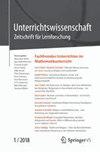运用反向辅导提升职前及在职教师的数位能力
Q2 Social Sciences
引用次数: 0
摘要
摘要本研究探讨了反向指导作为一种创新教学方法对提升职前教师和在职教师数字能力的有效性。我们对90名职前教师和57名在职教师进行了一项准实验干预研究,他们参加了为期两天的在线研讨会。反向指导干预的有效性,即职前教师和在职教师结对合作,共同开发在课堂上使用数字技术的想法,与大学职前教师研讨会(对照组1)和在职教师专业发展研讨会(对照组2)中同伴之间的协作学习形式进行了比较。以自我效能感和积极信念作为调查结果。各组职前教师和在职教师的自我效能感信念均有所提升,反向辅导并不比对照组更有效。TPK和对数字技术教学的积极信念在干预过程中没有改变。结果表明,职前教师可以有效地充当在职教师的导师,支持他们对数字技术使用的自我效能感信念。然而,在职前教师和在职教师中,我们没有发现反向指导比同伴学习更有效地促进数字能力的证据。本文章由计算机程序翻译,如有差异,请以英文原文为准。
Promoting pre- and in-service teachers’ digital competence by using reverse mentoring
Abstract The study investigated the effectiveness of reverse mentoring as an innovative instructional method to promote pre- and in-service teachers’ digital competence. We conducted a quasi-experimental intervention study with 90 pre-service and 57 in-service teachers who took part in two-day online-workshops. The effectiveness of the reverse mentoring-intervention, where pre- and in-service teachers worked together in pairs to jointly develop ideas for the use of digital technology in the classroom, was compared to collaborative learning formats among peers in university seminars for pre-service teachers (control group 1) and professional development workshops for in-service teachers (control group 2). Technological-pedagogical knowledge (TPK), self-efficacy and positive beliefs about teaching with digital technology were investigated as outcomes. Pre- and in-service teachers in all groups gained in self-efficacy beliefs, whereby reverse mentoring was not more effective than the control conditions. TPK and positive beliefs about teaching with digital technology did not change over the course of the interventions. The results show that pre-service teachers can effectively act as mentors for in-service teachers to support their self-efficacy beliefs regarding the use of digital technology. However, we did not find evidence that reverse mentoring is more effective than peer learning among pre-service and in-service teachers to promote digital competence.
求助全文
通过发布文献求助,成功后即可免费获取论文全文。
去求助
来源期刊

Unterrichtswissenschaft
Social Sciences-Education
CiteScore
2.10
自引率
0.00%
发文量
19
期刊介绍:
Unterrichtswissenschaft – Zeitschrift für Lernforschung ("Journal for Teaching and Learning") publishes research on learning and instruction in pre-school, school, higher education, occupational settings and various informal learning environments. The journal presents theoretical approaches and empirical research findings to facilitate the advancement of further research and evidence-based practice in education. Unterrichtswissenschaft is therefore indispensable for researchers and students in the fields of transfer research, teaching quality and didactics.
Unterrichtswissenschaft publishes original empirical studies, reviews, and theoretical articles in German and English. All articles are subject to double-blind peer review in order to meet the highest quality standards. Every issue contains a topical focus as well as unsolicited submissions, which are complemented by hot topic contributions.
The journal has an international audience with a special focus on German-speaking countries. It is one of the three most-cited German journals in educational research as identified by a Cited Reference Search in Web of Science, PsychInfo, and Harzing''s Publish or Perish (1999-2010). About 50 % of the references in Web of Science can be found in English-language publications.
 求助内容:
求助内容: 应助结果提醒方式:
应助结果提醒方式:


